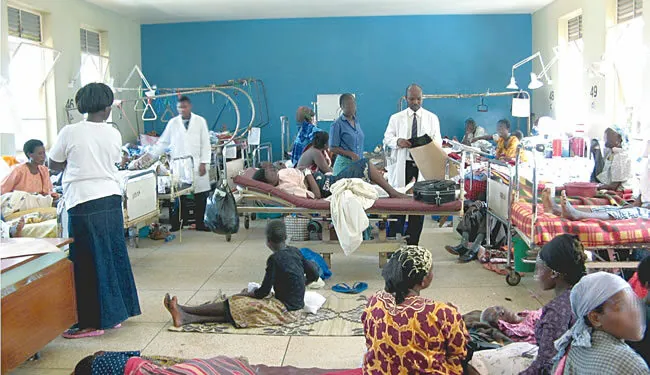There are no products in your shopping cart.
| 0 Items | £0.00 |


Ayo Akinfe
[1] This, ladies and gentlemen is a typical Nigerian hospital ward. Not enough beds or drugs, the wards are not clean enough, the staff are unmotivated and of course they suffer regular power cuts
[2] In the 1970s, under the Murtala/Obasanjo regime, there was a policy to municipalise healthcare by having one general hospital in each local government area. Maybe if that policy had been continued and backed up with funding, we might not have our current healthcare problems
[3] Nigeria currently has 774 local government areas. If each one has a well funded general hospital, we are home and dry. I believe this is something we can fund through the existing budget if we want to.
[4] At the moment, Nigeria has 1.67 hospital beds per 1,000 patients compared with say six on Indonesia, 3.48 in Zambia, 3.35 in the Democratic Republic of Congo and the sub-Saharan average of 2.93
[5] As things stand, we appear not really interested in healthcare, as we are somewhat content to leave this to the private sector. Unfortunately, private clinics are beyond the reach of most ordinary Nigerian. When you earn N70,000 a month, paying for healthcare simply cannot feature on your household budgetary plans. By the time you pay for food, housing, transport, your tithes and clothing, you will be penniless
[6] Nigeria’s total annual budget is about $30bn of which health accounts for less than 3%. Of the total spend only about 3% goes on healthcare. Totally unacceptable as it actually breaches an African agreement Nigeria once hosted, pledging 15% of her budget to healthcare
[7] In 2001, Nigeria hosted the African Union heads of state where they all signed the Abuja Declaration, under which the leaders pledged to commit at least 15% of their annual budgets to improving the health sector. Since the declaration, Nigeria has never voted more than 6% of its annual budget to the health sector. Actually, the highest percentage of the budget dedicated to health since the declaration was in 2012 when 5.95% was allotted to the sector
[8] South Africa spends 7.44% of its budget on health. In Brazil it is 8.9% and in Mexico it is 5.8%. These are the standards in other developing nations we need to match
[9] Do you know that 75% of all health spending in Nigeria is private? Apparently, Nigeria spends comparatively less on health than other African countries because of low government spending in general according to Dr John Ataguba, a health economics researcher at the University of Cape Town
[10] Bear in mind that health is not considered a basic need like food, clothing and shelter. It thus gets relegated to the background. I have not even delved into specialist secondary healthcare and the need for dedicated cardiac, renal, eye, dermatology, etc specialist hospitals. We are still struggling with primary healthcare. Something drastic needs to be done, however, if we want to see rapid economic growth